Prayer involves communication with a higher power seeking guidance and support, while meditation centers on mindfulness and self-awareness to achieve inner peace. Explore the distinctions and benefits of both practices in this article.
Table of Comparison
| Aspect | Prayer | Meditation |
|---|---|---|
| Definition | Communicating with a deity or higher power | Focused mental practice to achieve mindfulness or relaxation |
| Purpose | Seeking guidance, forgiveness, or expressing devotion | Enhancing awareness, reducing stress, or achieving inner peace |
| Origin | Rooted in religious traditions worldwide | Originates from spiritual and secular practices globally |
| Method | Verbal or silent communication, often with set prayers | Breath control, visualization, or silent focus |
| Participants | Individual or group, often in sacred spaces | Usually individual, can be group sessions |
| Spiritual Connection | Direct connection to a divine entity | Focus on self-awareness and consciousness |
| Benefits | Emotional comfort, hope, spiritual growth | Stress reduction, improved concentration, emotional balance |
| Examples | Christian prayer, Islamic Salah, Hindu Puja | Mindfulness meditation, Transcendental Meditation, Zen meditation |
Understanding Prayer and Meditation
Prayer centers on communication with a higher power, often involving requests, gratitude, or confession, while meditation emphasizes mindfulness and self-awareness through focused attention or open monitoring. Understanding these practices reveals that prayer fosters spiritual connection and faith, whereas meditation cultivates mental clarity and emotional regulation. Both can contribute to well-being but engage different cognitive and emotional processes.
Historical Roots of Prayer and Meditation
Prayer and meditation have distinct historical roots, with prayer tracing back to ancient religious practices aimed at communicating with deities in diverse cultures such as Mesopotamia, Egypt, and early Christianity. Meditation, originating from Eastern traditions like Hinduism and Buddhism, emphasizes mindfulness and inner awareness through focused mental exercises. Understanding these origins helps you appreciate how each practice shapes spiritual and mental well-being in unique ways.
Core Beliefs Behind Prayer
Core beliefs behind prayer emphasize communication with a higher power, seeking guidance, support, or intervention, reflecting faith and trust in divine influence. Meditation centers on mindfulness and self-awareness, focusing on inner peace and mental clarity without necessarily invoking a deity. Your choice between prayer and meditation depends on whether you prioritize spiritual connection or personal mental well-being.
Fundamental Principles of Meditation
Meditation centers on cultivating mindfulness, awareness, and inner peace through focused attention and breath control, distinguishing it from prayer's dialogic nature with a higher power. Core principles include intentionality, present-moment awareness, and non-judgmental observation of thoughts, promoting cognitive clarity and emotional regulation. Unlike prayer, which often seeks external guidance or intervention, meditation emphasizes self-awareness and mental discipline as tools for psychological well-being.
Purpose and Intent: Prayer vs Meditation
Prayer centers on communication with a higher power, seeking guidance, forgiveness, or expressing gratitude, while meditation aims to cultivate mindfulness, inner peace, and self-awareness. Your intent in prayer is often outward, fostering a connection with the divine, whereas meditation typically involves inward focus, calming the mind and observing thoughts without judgment. Understanding these distinct purposes helps you choose the practice that aligns best with your spiritual or mental wellness goals.
Techniques and Practices Compared
Prayer typically involves verbal or mental communication directed toward a deity, incorporating specific rituals, recitations, and postures such as kneeling or clasped hands, which aim to foster devotion and spiritual connection. Meditation emphasizes focused attention, breath control, and mindfulness techniques designed to achieve mental clarity, emotional calm, and present-moment awareness, often involving silent or guided practices without religious context. Both practices offer distinct cognitive and emotional benefits, with prayer commonly enhancing spiritual faith and meditation promoting stress reduction and neurological well-being through systematic mental discipline.
Psychological Benefits: Prayer vs Meditation
Prayer and meditation both enhance psychological well-being by reducing stress and promoting emotional balance. Prayer often involves a personal connection with a higher power, fostering hope and resilience in challenging times. Meditation, through mindfulness and focused attention, improves self-awareness and decreases anxiety by calming the mind.
Spiritual Outcomes and Experiences
Prayer, meditation, and contemplation each offer distinct spiritual outcomes and experiences, influencing your inner state differently. Prayer typically fosters a sense of connection with a higher power, promoting faith, hope, and divine guidance. Meditation deepens self-awareness and mindfulness, enhancing inner peace and clarity, while contemplation encourages profound reflection and insight, leading to spiritual growth and understanding.
Modern Scientific Perspectives
Modern scientific research highlights distinct neurological effects of prayer, meditation, and visualization on brain function and emotional regulation. Prayer often activates regions linked to social cognition and emotional processing, fostering a sense of connection and purpose, while meditation primarily enhances areas related to attention and self-awareness, promoting stress reduction and cognitive flexibility. Visualization engages neural networks involved in motor planning and sensory perception, facilitating goal-oriented mental rehearsal and performance improvement.
Choosing the Right Practice for Personal Growth
Selecting the right practice for personal growth depends on individual goals, such as seeking spiritual connection, mindfulness, or emotional balance. Prayer fosters a profound relationship with a higher power, offering comfort and guidance, while meditation enhances self-awareness and mental clarity through focused attention and relaxation. Integrating both practices can create a holistic approach, blending intentional surrender with mindful presence to cultivate inner peace and personal development.

Infographic: Prayer vs Meditation
 relatioo.com
relatioo.com